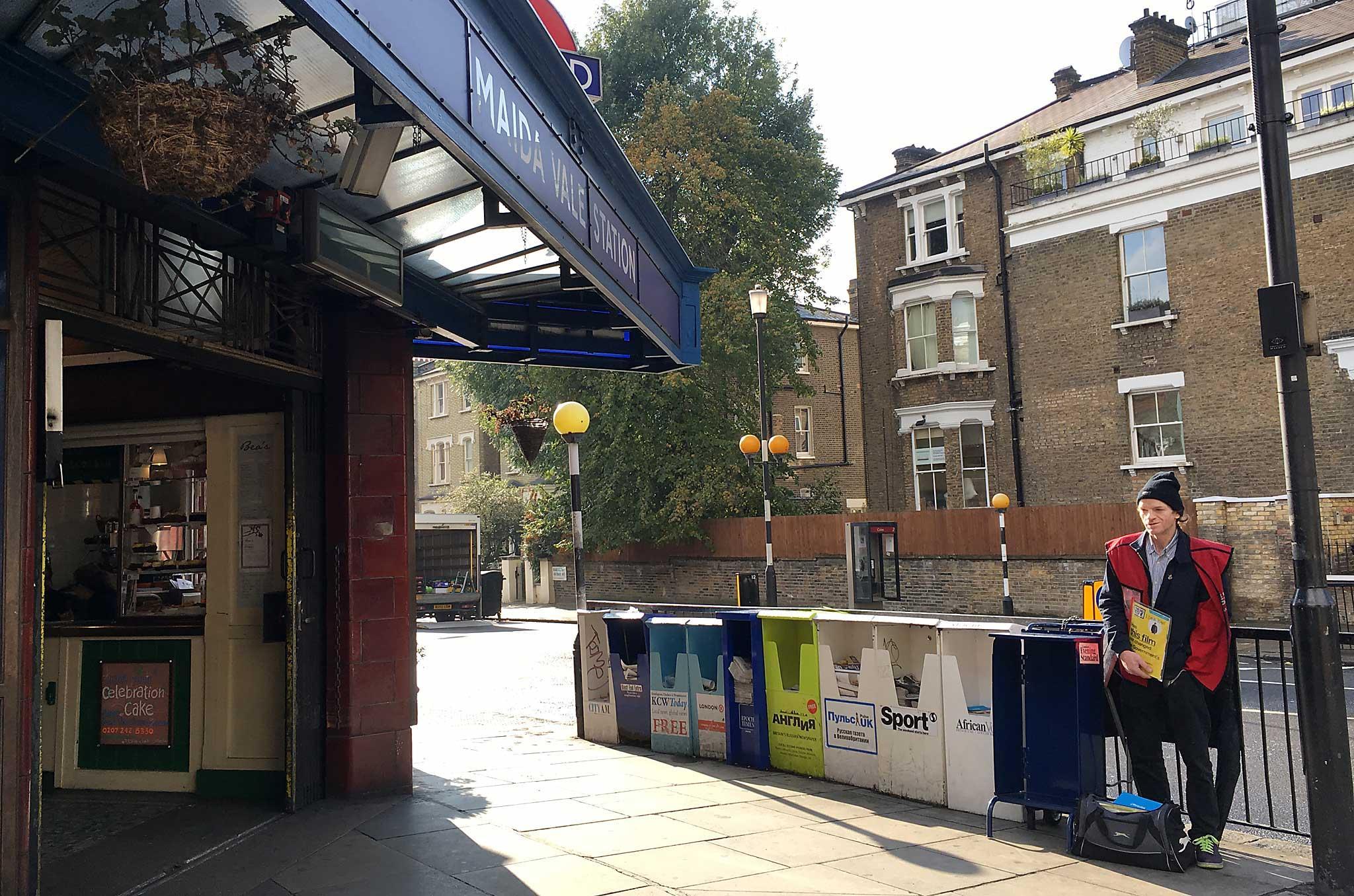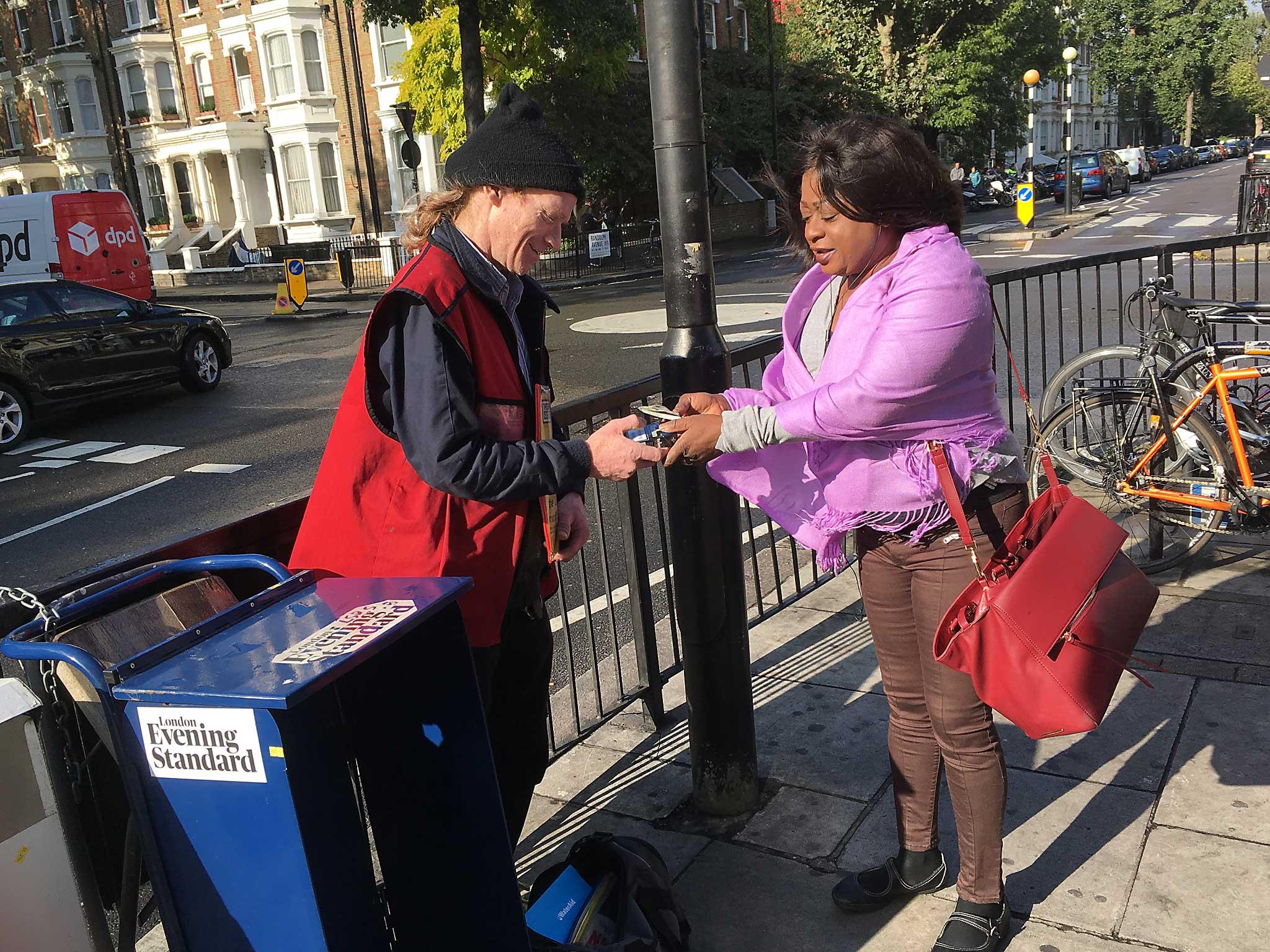‘Without The Big Issue I’d be dead’ – magazine celebrates 25 years
It has sold more than 200 million copies since its launch in 1991, helping thousands of people facing ‘disaster’ to get back to work. Chris McCormack sells the magazine on the streets of west London, and has picked up a few celebrity fans along the way
Your support helps us to tell the story
From reproductive rights to climate change to Big Tech, The Independent is on the ground when the story is developing. Whether it's investigating the financials of Elon Musk's pro-Trump PAC or producing our latest documentary, 'The A Word', which shines a light on the American women fighting for reproductive rights, we know how important it is to parse out the facts from the messaging.
At such a critical moment in US history, we need reporters on the ground. Your donation allows us to keep sending journalists to speak to both sides of the story.
The Independent is trusted by Americans across the entire political spectrum. And unlike many other quality news outlets, we choose not to lock Americans out of our reporting and analysis with paywalls. We believe quality journalism should be available to everyone, paid for by those who can afford it.
Your support makes all the difference.Chris McCormack is probably west London’s most popular man. He is friends with Hugh Grant, on first-name terms with the doormen of Notting Hill’s most exclusive private members club, and can’t spend more than five minutes on the millionaire streets of Maida Vale without someone saying hello.
Chris is also homeless. He is Big Issue vendor number 433, a job he says is the reason why he’s not dead yet.
This week marks 25 years since The Big Issue magazine was founded to offer people “a hand up not a hand out”.
Chris used to beg, but he had a change of heart five years ago. “I thought, why should people give me money sitting on the street with my hand out? When people who’d seen me begging saw I was selling The Big Issue they were pleased, they said they had respect for me.
“You get a better vibe from it. You’re putting something in and not just take, take, take. People who won’t give to beggars say ‘We’ll help you Chris, because you put something in.’ You get self-esteem from it. Without The Big Issue I’d be dead I reckon.”
More than 200 million copies have been sold since the magazine’s launch in London in 1991, changing the lives of thousands of homeless people by giving them the opportunity to work not beg.
The Independent spent the day with Chris, one of The Big Issue’s most prolific (and sociable) vendors.
At his regular pitch outside Maida Vale station his popularity is immediately apparent. “I did it for a bit in the West End and you got people who would stand in the street and piss on you,” he says.
“People said ‘get a job’. But in Maida Vale they all know me.” There are busier pitches, but he likes the community here. Underground staff give him a friendly nod and the lady in the station coffee shop says an enthusiastic “hello”. She usually gives Chris leftover food she has at the end of the day.

Big Issue vendors buy the magazine for £1.25 and sell it to the public for £2.50.
Chris is an anchor in the community here, as people bustle past with their busy lives. Two regular customers took him for a pub lunch to celebrate his 50th birthday in July.
He’s even friends with the local dogs. He spots a woman walking two German Spitz across the road and shouts out: “Hi Caroline, hi Cassie, hi Keira!” The woman, Caroline Carter, 53, crosses over to sing his praises. “Chris is a star. He’s always here at the corner keeping an eye on everyone. It’s nice to know there’s a friendly face.” He often seems to be the only person that people are stopping to say hello to in the street.
On Friday and Saturday nights he heads to a spot outside private members club Electric House on Portobello Road, until the small hours. He speaks highly of the celebrity clientele.
“I’ve met lots of nice people there, I know all the staff and management. People say ‘I bet Hugh Grant is a bit of an idiot’ but he’s a decent bloke. An absolute gent.
“He always gives me £20 and signs some magazines. And he’ll always speak to me for about half an hour. My dad died of cancer 18 months ago and I’d see Hugh every month. He’d come out with three women or whatever and he’d always speak to me before getting in the cab and see how I was doing.”
In his ripped Slazenger holdall Chris has magazines ready to sell, a blue carrier bag with a bottle of cider in it and his prized possessions: autographed copies. “If I’m having bad weeks I sell them for more dough. Pulling out a battered 2013 edition in a plastic sleeve, he says: “I’ve had this one for ages, it’s been signed by Lesley Phillips, Jonathan Ross and Damon Albarn. And this one’s signed by Bryan Adams.”
While he waits for the next customer, Chris leans on the railings on Randolph Avenue, looking out at Maida Vale’s wide tree lined boulevards of red-brick mansions. He grew up in a council flat at the end of this road but he could never dream of living here now. At an estate agent next door, one bedroom flats are on sale for more than £1m and his attempts at getting a council flat have failed.
His normally affable demeanour changes when he gets onto the subject of housing. “I keep hearing about ‘affordable housing’. F*** affordable housing. What happened to social housing? Council houses? It does anger me the gentrification of London. I find it disgusting that this government haven’t had the foresight to see what’s happening. When I was growing up round here most of these buildings had five or six flats in them with families. Now they’re single houses going for £5m. I’d have to win the EuroMillions on a rollover week to have a chance of living here.”
There was another life before this. In the Eighties he was into the punk scene, ending up DJ-ing at the same raucous parties as the Sex Pistols and on the cover of a Pink Floyd album. By day he used to work as a bricklayer and in shops but then he split up with the girlfriend he had lived with for 12 years and things started to go wrong.
“It petered out because I got into heroin. At the same time my best friend committed suicide. I ended up in a squat in Kings Cross and got into heroin big time and was drinking too. I was 30 and I ended up on the streets.”
Chris is 50 now but a stable home is still elusive. “I’m sofa surfing at friends’ places and sometimes I stay at my mum’s,” he says. It is a common misconception that sellers have to be living on the pavement to sell the magazine. As the magazine’s co-founder, John Bird put it, “anybody who is in a stage of disaster” is allowed to sell it.
After injecting heroin “on and off for 20 years” Chris avoids drugs now but still drinks three or four litres of cider a day. His last major drugs relapse was a couple of years ago when his dad was dying of cancer; “I couldn’t cope with the way my old man deteriorated”. The effects were stark. “I had a really bad spinal infection and three collapsed discs. I lost two inches in height.”
When he came out from a long stretch in hospital his customers all wanted to know where he had been. That gave him the motivation to keep going.
Back in Maida Vale, Faith Cole, 56, a nurse who came to Britain from the Gambia when she was 17 and now runs a fancy vitamin injection clinic, comes by to say hello. She doesn’t buy the magazine, instead giving Chris a fiver and some cigarettes. “He needs more money and I don’t want him to waste a magazine. There’s not a single bad bone in him and I think people need to help him because he deserves more than what he gets.
“He helps me carry my cases home if they’re heavy.”
A few minutes later, a young man in a hoody stops by to say hello. This is Jack Gahan, a physics student with a shy smile whose dad happens to be Depeche Mode’s lead singer. “We’ve been friends for three years,” Gahan junior says of Chris. “He looks after the place and looks out for everyone here.”
Chris’s warmest winter coat is one of Dave Gahan’s cast offs. After Depeche Mode went on tour to Russia in 2006, they were all given matching Schott goose down jackets with two hoods. “Jack’s dad gave it to him but he didn’t want it so he gave it to me.”
Chris laughs at the suggestion it might be have value as a bit of fan memorabilia. “It’s not a collectors item – I wear it!”
Another half hour goes by with no sales and Chris is flagging. He has been standing here all morning and only sold one magazine so decides to go back to his friend’s house for a snooze. Living on the streets has ruined his ability to sleep at night and he does his best work between seven and nine in the evening as people come out of the station on their homeward commute.

Back at the station with renewed energy and cider supplies at seven, Chris gets his patter going and is an impressive flirt. If a passing woman gives him even a glimmer of a smile in response, he shouts after them, “Thank you for that smile, it’s free and beautiful.”
After a few trains come in, he sells to one of his regulars, Terry Schoen, a 59-year-old IT consultant from the west coast of America who has lived in Maida Vale for nearly 20 years. Shortly afterwards a young man in a leather jacket stops to say hello. Francesco Lanni, 28, works for a credit ratings agency and says Chris is “The best Big Issue seller in the world”. He had already bought a copy of the magazine two nights before.
As the evening wears on Chris seems to fade into the background. It is striking how many people make no eye contact and walk past, even when he is talking to them and trying to impress with his best rhyming sales pitch.
“Sometimes you feel invisible. If people acknowledge me and say ‘Yes’ or ‘No’ that’s alright, at least they know I’m here and I’m getting a bit of social interaction with them….
“But if you get 30 or 40 people come off a train and not one of them says ‘yes’ or ‘no’, they just completely ignore you it’s soul destroying, especially if you get two, three, four trains in a row like that.”
On average he pockets around £25 a day but occasionally he hits the jackpot. “I was down Portobello Road earlier this year one evening and someone gave me £100. We just got chatting and the next thing I know he went to a cashpoint. I made £206 in one night, I got the rest selling the issue. But that’s once in a blue moon.”
Tonight he only sells another two magazines, making his total for the day just four issues, plus a donated fiver and some cigarettes. He stays until midnight hoping for more, before taking off his tabard, picking up his bag and heading off in search of a place to sleep.

Join our commenting forum
Join thought-provoking conversations, follow other Independent readers and see their replies
Comments